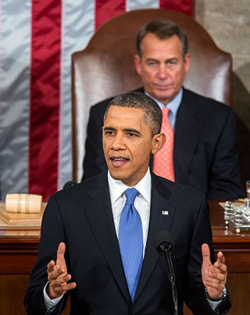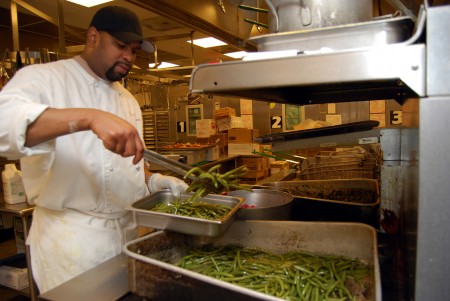- Home
- News
- Features
- Topics
- Labor
- Management
- Opinions/Blogs
- Tools & Resources
Minimum Wage Increase Would Give Up To 28 Million Workers A Raise
Increasing the minimum wage would give as many as 28 million American workers a raise.
According to the Economic Policy Institute, raising the federal minimum wage from $7.25 to $9.80 per hour would give more than 28 million workers a raise. The increase would also create approximately 100,000 new jobs during three years, according to the EPI.
A movement to increase the federal minimum wage has been gaining steam in the wake of the Great Recession. Raising the federal minimum wage was given a big boost when President Barack Obama proposed raising the age in his recent State of the Union speech.
Last year, Sen. Tom Harkin (D-Iowa) introduced the Rebuild American Act, which proposed raising the minimum wage to $9.80 an hour. The bill died in the last congress.
Reviving The Minimum Wage Bill
Harkin says The Rebuild American Act would boost the minimum wage up to $10.10 an hour by 2016.
President Obama has proposed raising the minimum wage to $9 an hour by 2015.
The federal minimum wage was last increased on July 24, 2009, when it rose from $6.55 to $7.25 per hour. It was the last step of a three-step minimum wage increase approved by Congress in 2007.
Prior to 2007, the minimum wage was $5.15 per hour for 10 years.
In a report released last year, How Raising The Federal Minimum Wage Would Help Working Families And Give The Economy A Boost, EPI researchers Douglas Hall and David Cooper showed that raising the minimum wage would provide a substantial lift to the economy, generating almost $40 billion in increased wages.
Contrary to prevailing myths about minimum-wage workers, raising the minimum wage would benefit millions of workers across demographic groups and not just teenage part-time workers.
Nearly 88% of workers who would be affected by a minimum wage increase are at least 20 years old.
Female and non-minority workers would benefit disproportionately from the increase. Women comprise nearly 55% of those affected by a wage increase, and non-Hispanic white workers make up about 56%.
While increasing the minimum wage immediately benefits the lowest-paid workers through boosted earnings, it also yields positive effects on the larger economy, according to EPI research.
Raising the federal minimum wage to $9.80 would put nearly $40 billion in the hands of directly and indirectly affected families.
These families would be more likely than any other income group to spend these extra earnings immediately on basic needs or services they could not previously afford, proving an immediate boost to the economy.
An increase in the federal minimum wage from $7.25 to $9.80 per hour would mean a net increase in economic activity of approximately $25 billion, creating approximately 100,000 new jobs.
A minimum wage increase would also have a positive effect on job creation in every state.
“With the national unemployment rate not budging below 8%, now is the perfect time to raise the minimum wage,” said Hall. “Not only will it generate billions of new dollars for the economy while adding new jobs when we sorely need them, it will begin to address the wage stagnation working families have faced during the last four decades, while putting more money in their hands when they need it most.”
http://www.epi.org/press/increasing-federal-minimum-wage-give-28/
See also:
Minimum Wages Key To Cutting Working Poverty, Says ILO
Bad Jobs Rising: 24% Of American Workers Stuck In Low-Paying Bad Jobs
From CBSNews.com:
Minimum wage a bad idea? Ask execs who pay even more
There are many examples of business leaders who believe that paying well above today’s minimum wage not only does not hurt their bottom line, but helps it.
Take, for example, Whole Foods Markets, led by libertarian CEO John Mackey.
According to Kate Lowery, head of public relations at Whole Foods, the average non-executive hourly pay is $18.63.
Executives there have argued that higher morale, presumably in part because of better pay, leads to higher productivity and lower turnover.
That sentiment is echoed at retail giant Costco.
“If you have the best people in the marketplace working very hard because they’re being paid better, you end up spending less on labor, not more,” Joel Benoliel, senior vice president and chief legal officer at Costco, said in a recent interview. “There’s a fundamental misunderstanding among many employers who focus on how little they can pay. Our philosophy is that we actually pay less for labor per hour when we look at productivity and sales per hour.”
“We’d all be better off in our country if the lowest-paying jobs paid enough for people not to be on food stamps and not to be on welfare when it comes to going to the hospital,” he added.
David Bolotsky, CEO of Uncommon Goods, a Brooklyn, N.Y.-based online retailer of handmade and recycled goods founded in 1999, got a chance to discuss the minimum wage with Mr. Obama in November as one of a dozen small business executives invited to meet with the president and senior members of his economic team, including Alan Krueger, head of the White House Council of Economic Advisers.
For Bolotsky, who said Obama was receptive to raising wages, the decision to pay seasonal workers a minimum of $11 an hour—or 50% more than the state average—is less about business than about fairness.
“I don’t think it’s ethical to pay people as little as you can,” he said.
“We could probably get away with people paying $8 to $9 and hour and not see a dramatic change in the quality of our workforce…. But I believe that overall you’ll get a higher-caliber individual if you’re willing to pay more. You may in fact invest more of your management time in coaching and mentoring if you’re paying them more.”
Read the rest of the story here:
http://www.cbsnews.com/8301-505123_162-57569266/minimum-wage-a-bad-idea-ask-execs-who-pay-even-more
Arguments In Favor Of Minimum Wage Laws
Supporters of the minimum wage claim it has these effects:
- Increases the standard of living for the poorest and most vulnerable class in society and raises average.[35]
- Motivates and encourages employees to work harder[36]
- Stimulates consumption, by putting more money in the hands of low-income people who spend their entire paychecks.[35]
- Increases the work ethic of those who earn very little, as employers demand more return from the higher cost of hiring these employees.[35]
- Decreases the cost of government social welfare programs by increasing incomes for the lowest-paid.[35]
- Encourages people to join the workforce rather than pursuing money through illegal means, e.g., selling illegal drugs [37][38]
- Encourages efficiency and automation of industry.[39]
- Removes low paying jobs, forcing workers to train for, and move to, higher paying jobs.[40][41]
- Increases technological development. Costly technology that increases business efficiency is more appealing as the price of labor increases.[42]
https://www.wideworldofwork.com/gab_gallery/raising-the-minimum-wage-the-graphic-story/
Please subscribe to WOW’s posts by email:
[subscribe2]
List your business in the premium web directory for free This website is listed under Human Resources Directory







